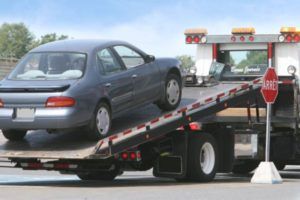Car Repossession and Bankruptcy
 When a borrower defaults on their car loan, the lender usually has the right to repossess the vehicle. In most cases, they do not even need to provide you with notice of the impending repossession. If you fear you may be facing an impending car repossession, don’t hesitate to get in touch with an experienced Tennessee and Georgia bankruptcy attorney. You will want to discuss how filing bankruptcy can help prevent vehicle repossession or even, in some cases, help you get back a car that has already been repossessed.
When a borrower defaults on their car loan, the lender usually has the right to repossess the vehicle. In most cases, they do not even need to provide you with notice of the impending repossession. If you fear you may be facing an impending car repossession, don’t hesitate to get in touch with an experienced Tennessee and Georgia bankruptcy attorney. You will want to discuss how filing bankruptcy can help prevent vehicle repossession or even, in some cases, help you get back a car that has already been repossessed.
The moment your attorney files your bankruptcy petition , the automatic stay goes into effect. The automatic stay forces creditors to stop all attempts to collect on the debts associated with the bankruptcy. Creditors are prohibited from calling the petitioner, moving forward with any lawsuits, conducting any repossessions, or foreclosing on or selling any of the debtor’s property in an attempt to gain compensation for a debt. The automatic stay of bankruptcy provides complete protection from creditors with very few exceptions. Creditors must seek permission from the bankruptcy court before continuing any efforts to collect.
If you are behind on your car payments, but your car has not been repossessed yet, contact a bankruptcy attorney today about filing for bankruptcy. If you wait too long to file, you may wake up one day or walk out of the grocery store one day to find your vehicle missing. If you fear your lender may be attempting to repossess your vehicle soon and you do not have the funds to bring the account up to date, filing bankruptcy could be your best option to stop repossession. Through a Chapter 13 bankruptcy , petitioners have the opportunity to catch up on their past due balance and pay off the loan during the 3-5 year repayment plan through the bankruptcy court. Most Chapter 13 payments are lower than the normal payment. Through a Chapter 7 bankruptcy, petitioners can delay the car repossession temporarily to take advantage of a few months (best case scenario) to bring the account current.
If your lender has already repossessed your vehicle, contact a bankruptcy attorney to discuss options. What options are available and whether or not bankruptcy can help you remedy the situation will depend on when the vehicle was repossessed and what type of bankruptcy you file. After a car is repossessed, you have a short amount of time (generally ten days, but this depends on state law and the lender) before the lender resells the vehicle. Once the car is sold and a third party holds the title, you usually cannot get the car back. If the lender has not yet sold the car to a third party, there is a chance to file a Chapter 13 and recover the vehicle because the automatic stay will stop the sale of the vehicle. This requires quick action, so if your vehicle has been repossessed and you want to attempt to get the vehicle back by filing for bankruptcy, contact a bankruptcy attorney as soon as possible.
Do you have questions about filing bankruptcy, or about which type of bankruptcy would stop a vehicle repossession? The experienced Tennessee and Georgia bankruptcy attorneys at Kenneth C. Rannick P.C. can help. We help good people through bad times every day, and we can help you, too.
The post Car Repossession and Bankruptcy appeared first on Kenneth C. Rannick, P.C..










